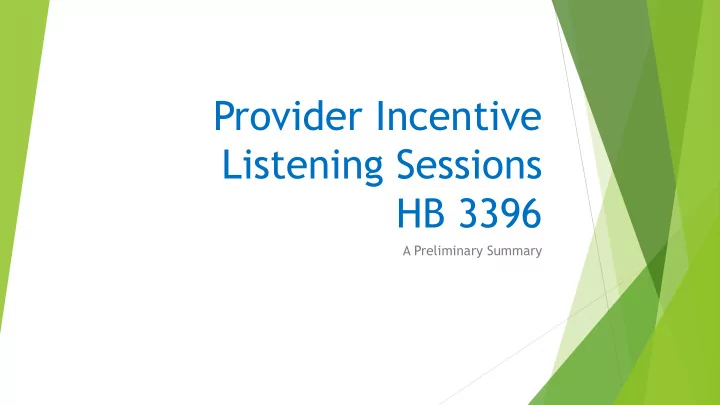

Provider Incentive Listening Sessions HB 3396 A Preliminary Summary
Five Listening Sessions Held Prineville Pendleton Roseburg Lebanon Astoria
Purpose Hear from community members, providers, clinics, hospitals on what works and doesn’t work Get some response to data and preliminary findings from Lewin Get input on what is needed and what else should be explored
Summary Heard from more than 100 Oregonians 24 counties represented 13 of 16 CCOs covered Range in number of people participating from 12 to more than 60 HCWF Committee members attending: Jeff Papke (Prineville) Dan Saucy (Roseburg) David Pollack (Lebanon and Astoria) Jeff Clark (Astoria — by phone)
What was heard — Some samples Prineville We need to do a better job of “grow your own” Need more primary care residency programs/slots Retirement options needed Need bigger packages/solutions than just “loan repayment” Compensation important, but fit in the community important as well Need to distinguish between short-term and long-term solutions; need both Quote: “If loan repayment is it, you will simply have a revolving door —no retention…and it’s more than compensation. It's family, quality of life and having a rewarding career.”
What was heard — Some samples Pendleton Pharmacists are missing from eligibility for many programs and there’s a need Loan repayment amounts are too low, tax credits too low. Better than nothing but need larger amounts to provide a bigger enticement Need more training, rural rotations, residency slots Workforce is aging; there’s a crisis that is almost her J-1 program is working; tax credit helpful (although low); need to expand SLRP Quote: “There’s a very aging workforce among primary care docs, which is only going to exacerbate the shortage we’re already facing”
What was heard — Some samples Roseburg Federal resources are not enough Preceptors and mentoring is costly Too much uncertainty with whether the programs will keep providing awards Offer a new kind of scholarship program for people willing to go rural Lots of burn-out in rural practices Recruitment and retention a full-time job Quote: “If we didn’t have J -1 we wouldn’t be in business…J -1 is a lifesaver!”
What was heard — Some samples Lebanon Not enough residency slots — need to invest lots more in GME Rural tax credit very important Compensation a bigger challenge in rural Oregon Programs should be available to all, regardless of institution Bidding wars within local communities a real problem Retirement an issue Quote: “The real question is what’s the impact if we don’t invest in these incentive programs.”
What was heard — Some samples Astoria Not enough housing in the community for training or locating doctors Big lack of behavioral health providers HPSA scores too volatile Allow people to request longer-term service commitments than just 2-3 years. Provide paid continuing education for those in the incentive programs to deal with burnout and help inspire providers Quote: “Administrative simplification of the programs would be a huge value- add.”
What’s next ? Final Summary completed by July 31, 2016
Recommend
More recommend